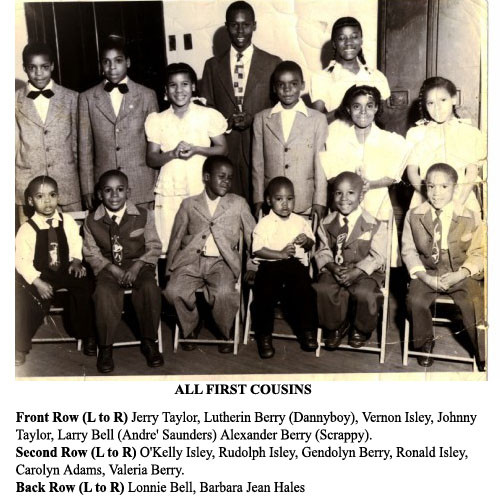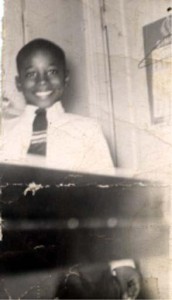THE INCIDENT
(By) Andre’ Saunders
In conflict, I observe my surroundings. Tall buildings growing like trees in this unfamiliar concrete jungle. The buildings’ hard edges are softened by auto exhaust fumes on this gray cloudy day. But stores where there used to be houses and highways running through old neighborhoods, all familiar landmarks now made obscure with change.
And a lot has changed since the incident. The incident that made a boy a man much to soon. But still, where am I? I should still be able to find my way back home.
 The first lessons learned in 1940’s segregated African American communities were your name, address and telephone number. And so well had this lesson been taught that, 37 years later, I can still remember the address of an 8-year-old child. Yet I’m lost and can’t find my way home.
The first lessons learned in 1940’s segregated African American communities were your name, address and telephone number. And so well had this lesson been taught that, 37 years later, I can still remember the address of an 8-year-old child. Yet I’m lost and can’t find my way home.
Home for me as a child was usually Granny’s house. A small two story home, with never enough bedrooms, but always filled with kids. Erma Bell’s grandchildren, the third generation born to this family of former slaves.
There were usually five of us at any given time: Danny boy, Scrappy, Jerry, Johnny and my-self. Though, sometimes Aunt Sis (Sally Bell Isley), would bring her four boys, and we would either rehearse for some church event, or just hang out. Or another one of our Aunts would drop off their kids and our numbers would increase. But somehow there was always room at Granny’s house.
And, Granny’s house always felt like love, fried chicken, cornbread and music. Sometimes there were special occasions when it felt like cake and punches on your arm.
It was a tradition, that for every birthday year, you got a hit on your arm. You would stand there and watch as we all lined up grinning, and telling you how you were going to be hit you so hard your arm would drop off.
With much laughter, you would stand like a man and say, “take your best shot”, and try not to cry. How proud you were to be another year older and closer, oh so much closer to becoming a…a…TEENAGER!
Saturdays at Granny’s was always special. Granny, usually got us up, she would come into our room and sort of shout in a singing way, “Rise and shine, everybody out of bed”. She would then go down to the kitchen, and within minutes, the smell of breakfast would have us rushing to get down stairs.
The five of us cousins, ages five through twelve, in one bathroom, well it was crowded, but fun. During the week we were slow in the bathroom and slow out the bathroom, because these were school days and Granny worked. But on Saturday mornings, we rushed.
By the time we got downstairs, Granny would have made thick slab bacon (the rind still on), and eggs with old fashioned, start from scratch, biscuits. And sometimes, Granddaddy would let us drink coffee and tell us stories about ‘Bro. Rabbit’ and recite poems.
After breakfast, Granny would start cooking Sunday’s meal for the family because she would be in church all day on Sundays. So, Saturday mornings, Granny cooked breakfast and after-noons, Granny rehearsed her choir for Sunday’s services.
When Granny cooked, she did so for at least seven, so everything was in large proportions. There would be mounds of chicken, some fried and some smothered in thick, dark brown pan-gravy with chicken drippings with the chicken neck and giblets cooked in.
There would be pans of corn bread, pots of black-eyed peas, collard greens, mashed potatoes just waiting for some of granny’s pan gravy to be poured over and maybe for dessert, one of granny’s cakes.
The rule was, you could look and you could smell but you could not touch. This was Sunday’s dinner, and you couldn’t have any until Sunday. You touched, you die.
But this was Saturday, and after breakfast, Granny would give the eldest (Danny boy), some money and send us to the Taystee Bread factory to buy half-priced bread and cakes for the week.
That was a chore we all loved to do, so Granny would send us all. But, she never failed to add, “remember to hold hands when you cross the street”. To this day, a Twinkie never fails to remind me of those youthful days.
When we got back, Granny or Granddaddy might give us each fifty cents each and send us to the movies. Wow! It’s hard to believe that fifty cents use to buy a ticket to the Regal Theater on Lynn Street. Imagine, $.50 paid the ticket and was still enough to buy popcorn or soda.
 The day of the incident began as a typical Saturday at Granny’s house. We had eaten and did our chores so Granny gave us (Dannyboy, Scrappy, Jerry, Johnny, and me), money to go to the movies. After the movie, we decided to play some games at the Union Terminal Train Station.
The day of the incident began as a typical Saturday at Granny’s house. We had eaten and did our chores so Granny gave us (Dannyboy, Scrappy, Jerry, Johnny, and me), money to go to the movies. After the movie, we decided to play some games at the Union Terminal Train Station.
On our way we were stopped by three white boys. They told us that we couldn’t go into the terminal because we were “Niggas”.
This was 1954, and White folk were still hanging Afro-Americans, so we were frightened. We also knew, if anything happened to Johnny, (the youngest and Granny’s favorite), Granny would kill us. So Dannyboy, the eldest, wanted to leave.
We had started to leave when one of the white boys pushed my cousin Johnny. Johnny at that time was about 5 years old and he started to cry. Now, talking is one thing, but when you hit or push one of us, you’ve got to deal with all of us.
To stick together, to take care of each other, this was a rule Granny had taught us since birth.
On our way to the terminal, we had picked some walnuts from trees that used to grow in Cincinnati, to throw at each other.
I had also picked up a stout tree limb to use as a bat to hit the walnuts. I still had this tree limb, my bat, and I tried to kill this White boy.
I wanted to knock his head off: I hit him on the head, the arms, the feet, anywhere I could. The other two white boys just ran away, leaving their friend. My cousin Jerry jumped on me and pulled me off, then we too ran away.
When we got home Dannyboy told Granny what happened and she called my mother and other family members. Two days later, I returned to the same Union Terminal to board a train for New York.
I was going to live with my father in New York because my family was afraid I would be killed or harmed in retaliation. This was Cincinnati in 1954, one year before Emmett Till’s murder, the Year of Brown v Bd. of Education which ended segregation in public schools, and I……..I was 8 years old.